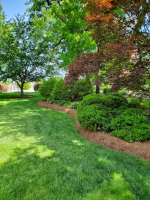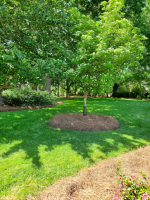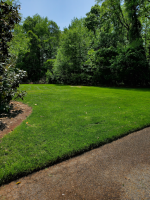I am sure that you have aerated the soil and put a sand peat moss mixture down. Sometimes you have to go 3-5 inches deep. I would not recommend going with a aerator that you can rent, check to see about getting it done professionally. that way they have stronger tynes and larger holes.
You are using an out of date browser. It may not display this or other websites correctly.
You should upgrade or use an alternative browser.
You should upgrade or use an alternative browser.
Southern clay soil. ugh.
- Thread starter mark abby
- Start date
More options
Export threadStarTech
Lawn Royalty
- Joined
- Feb 19, 2020
- Threads
- 120
- Messages
- 12,817
I would avoid that the cotton stuff as I tried it in my garden years ago. Well the first year was great but the years after that the Alabama red clay turn to basically rock hard from the cotton fibers. It took me nearly five to restore the garden loam soil with lots and lots of leaves and peak moss. Now sawdust would work fine.
I mean even a rototiller could barely break the surface once the soil started drying out.
I mean even a rototiller could barely break the surface once the soil started drying out.
MyGrassHasCrabs
Member
- Joined
- Sep 18, 2017
- Threads
- 1
- Messages
- 44
I live in NC & have the same nasty, dense red clay soil. If I have to dig in it it's like digging in bricks. I've been in the same house for over 20 years. Until recently I always purchased grass seed for fall overseeding from Home Depot - always with mediocre results. The last couple of years I've been buying seed & fertilizer from our local Seed & Feed store. Regrettably, I don't remember the brands, but I purchased separate shade & sun blends (shade was more expensive). The seed was nad-grabbing expensive, around $120 for 50 lbs for shade and $90 for sun, but it performs much better than the crap I'd been getting from Home Depot. The lesson I learned was to buy quality. I used less and got significantly better results with higher quality seed. Sorry I don't have the brand names, but your local seed & feed store may have "the good stuff". Naturally, it always looks best in spring and fall (pics below were taken last spring).
I'm planning on getting a soil analysis also - always good to know what your soil needs for decent grass.



I'm planning on getting a soil analysis also - always good to know what your soil needs for decent grass.



Cajun power
Active Member
- Joined
- Apr 11, 2023
- Threads
- 1
- Messages
- 86
I work large estate properties in south louisiana.
eventually, you find areas where the clay, sand, and nutrients, or water table just can't sustain normal grass growth. There are just so many factors involved. Ultimately, in problem areas, I take the long term approach...plant test plots with multiple different varieties of grass and see which will grow and endure. In areas, where I need grass to grow quickly in order to fill in exposed soil and prevent erosion, my go to is perennial rye. eventually the zoysia and augustine will overtake it, but it works well to "patch" areas, where we have done dirt work.
another technique is to locate the closest area on the surrounding lawn where the grass is living well and then take a plugs from that and transfer them to the problem areas.. If that doesn't work, then you know pretty much that you are dealing with some kind of nutrient starved soil and it's unlikely anything is going to grow there unless you address that first. I'll give you an example: we have a few places that are near surface springs...always wet just inches below the soil. The bacterial and fungal and mold growth is too toxic for grass growth. For that area, we had to come up with a completely different way to landscape and eventually decided to simple grow bushes and small trees. Some areas we learned could not support growth at all, no matter what we planted and transplanted and we concluded that at some point that area was contaminated or contained naturally occuring heavy metals, toxins, domestic animal runoff, old sewer/septic systems, and even industrial waste. There can also be infestation of nematodes that will destroy new grass growth which can be hard to detect (and yet, pretty easy to control..I use dawn liquid soap!).
You can have the soil chemically diagnosed, yes, but ultimately you are going to have to test what grass and what treatment and what conditions are best to establish new lawn grass. That just takes experimenting. I would go with perennial rye because it is very hardy, grows quickly and is a cheap and will not break the bank if you find even rye isn't going to grow there.
eventually, you find areas where the clay, sand, and nutrients, or water table just can't sustain normal grass growth. There are just so many factors involved. Ultimately, in problem areas, I take the long term approach...plant test plots with multiple different varieties of grass and see which will grow and endure. In areas, where I need grass to grow quickly in order to fill in exposed soil and prevent erosion, my go to is perennial rye. eventually the zoysia and augustine will overtake it, but it works well to "patch" areas, where we have done dirt work.
another technique is to locate the closest area on the surrounding lawn where the grass is living well and then take a plugs from that and transfer them to the problem areas.. If that doesn't work, then you know pretty much that you are dealing with some kind of nutrient starved soil and it's unlikely anything is going to grow there unless you address that first. I'll give you an example: we have a few places that are near surface springs...always wet just inches below the soil. The bacterial and fungal and mold growth is too toxic for grass growth. For that area, we had to come up with a completely different way to landscape and eventually decided to simple grow bushes and small trees. Some areas we learned could not support growth at all, no matter what we planted and transplanted and we concluded that at some point that area was contaminated or contained naturally occuring heavy metals, toxins, domestic animal runoff, old sewer/septic systems, and even industrial waste. There can also be infestation of nematodes that will destroy new grass growth which can be hard to detect (and yet, pretty easy to control..I use dawn liquid soap!).
You can have the soil chemically diagnosed, yes, but ultimately you are going to have to test what grass and what treatment and what conditions are best to establish new lawn grass. That just takes experimenting. I would go with perennial rye because it is very hardy, grows quickly and is a cheap and will not break the bank if you find even rye isn't going to grow there.
When I lived in southern Kentucky, I planted KY bluegrass because Centipede and St Augustine doesn't grow well. Poor soil, lots of rocks, clay, you name it.We live in south Kentucky, we moved here from Rochester in NYS. Back up north we had a fabulous lawn, but, down here we have tried just about every grass seed on the market (including zoysia pods) but nothing actually grows, and if it does, it looks like crap. We even tried True Green (mistake) and there was no difference. Plus, all the grass turns brown in the winter around here...never had that issue up north. I've thatched, aerated, put lime down, fertilizers, nitrogen, you name it. I get very little results.
My question is what is the best grass seed for this clay soil?
And, our other problem is it's hard to find real good top soil here in south Kentucky. I'd have to drive like 75 miles just to get a trailer full. What is offered as top soil around here is questionable.
oldgearhead
Member
- Joined
- Jul 4, 2018
- Threads
- 5
- Messages
- 33
I feel your pain! I moved from IL/WI border to a small town Cadiz in western KY, living on Lake Barkley. I went from a great lawn in IL to rocks and scattered greens. I was happy in the beginning that it was green, even if just weeds. We also did alot of construction and other yard items requiring lots of "top soil". I was told (from a trusted contractor) this was the best in the area and it looked nothing like the black crumbly soil we came from. Here is what helped to get to a full green lawn in the front yard (still working on the back side):
- Totally agree with getting your lawn tested, you can use the local farm bureau.
- Aerate, aerate, aerate....I use both physical aerator and liquid aerator (although I had my doubts before using it , the liquid aerator worked well)
- I lime every year (2x) which was a huge improvement in grass growing and weed eradication. In my area the soil is naturally acidic.
- I had better luck with liquid fertilizer (Tru-Green) than solid. I was surprised they did not work out for you.
- Here are the products I would recommend, that I used and continue to use with great results
- Best grass seed IMO, after trying MANY - Jonathan Green Black Beauty Original (jonathangreen.com)
- I at times have "protected" this seed by planting rye seed along side to help it along. Due to the heat and lack of rain I either plant in spring (rainy season here), fall and end up watering or at times "dormant seeding" (once ground temp is below 50F). I do not water the grass in summer due to acreage. I only water newly seeded areas when I seed, otherwise as stated no watering.
- Simple Lawn Solutions (simplelawnsoluions.com)
- I use their liquid aerator with great results-"Liquid Lawn Loosener"
- I also have been using their fertilizer products in the areas I do not use Tru Green
- They have a great tech support and chat; willingly provide advice and support (in my experience)
- Best grass seed IMO, after trying MANY - Jonathan Green Black Beauty Original (jonathangreen.com)
- I use an aerator attached to my Polaris side by side: I give my wife some wine on a "cool" day and tell her drive it back and forth until I tell you to stop.
- I have not had luck with commercial aerators that like to go one round and leave. Too many rocks and initially our aerator just bounced around in areas. It takes LOTS of aerating and patience.
- Finally, I cut my lawn on the high side for protection from the heat and to crowd out weeds. But in reality, I cut it high as I have yet to find all the "hidden rocks" in my lawn and those that seem to show up without warning. They clone in my area, I have no doubts. I cut at 4 inches with good luck and a great looking lawn.
Have the soil analyzed then treat the soil with the proper fertilizer.….. Otherwise you are wasting money on grass seed.
Want to "Soften up" the clay? Check out AERIFY PLUS (liquid aeration) at www.natureslawn.com I have had good luck with this product and this would be your first step to a nice lawn.……. This stuff really works!
Want to "Soften up" the clay? Check out AERIFY PLUS (liquid aeration) at www.natureslawn.com I have had good luck with this product and this would be your first step to a nice lawn.……. This stuff really works!
I live near DFW airport in Dallas amd there is a huge band of clay soil that runs SW to NE In this area.
I’ve had best luck with St Augustine Sod.
I then follow it up by following the Scotts Fertilizer Plan for Southern St Augustine.
I usually have the healthiest, thickest turf in our neighborhood.
I also mulch all things (grass and leaves) so I usually skip the fall fertilizer application.
I’ve had best luck with St Augustine Sod.
I then follow it up by following the Scotts Fertilizer Plan for Southern St Augustine.
I usually have the healthiest, thickest turf in our neighborhood.
I also mulch all things (grass and leaves) so I usually skip the fall fertilizer application.
